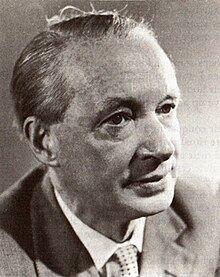Analysis of The Killing
Edwin Muir 1887 (Orkney) – 1959 (Cambridge)
That was the day they killed the Son of God
On a squat hill-top by Jerusalem.
Zion was bare, her children from their maze
Sucked by the dream of curiosity
Clean through the gates. The very halt and blind
Had somehow got themselves up to the hill.
After the ceremonial preparation,
The scourging, nailing, nailing against the wood,
Erection of the main-trees with their burden,
While from the hill rose an orchestral wailing,
They were there at last, high up in the soft spring day.
We watched the writhings, heard the moanings, saw
The three heads turning on their separate axles
Like broken wheels left spinning. Round his head
Was loosely bound a crown of plaited thorn
That hurt at random, stinging temple and brow
As the pain swung into its envious circle.
In front the wreath was gathered in a knot
That as he gazed looked like the last stump left
Of a death-wounded deer's great antlers. Some
Who came to stare grew silent as they looked,
Indignant or sorry. But the hardened old
And the hard-hearted young, although at odds
From the first morning, cursed him with one curse,
Having prayed for a Rabbi or an armed Messiah
And found the Son of God. What use to them
Was a God or a Son of God? Of what avail
For purposes such as theirs? Beside the cross-foot,
Alone, four women stood and did not move
All day. The sun revolved, the shadows wheeled,
The evening fell. His head lay on his breast,
But in his breast they watched his heart move on
By itself alone, accomplishing its journey.
Their taunts grew louder, sharpened by the knowledge
That he was walking in the park of death,
Far from their rage. Yet all grew stale at last,
Spite, curiosity, envy, hate itself.
They waited only for death and death was slow
And came so quietly they scarce could mark it.
They were angry then with death and death's deceit.
I was a stranger, could not read these people
Or this outlandish deity. Did a God
Indeed in dying cross my life that day
By chance, he on his road and I on mine?
| Scheme | ABXCXXDXDXEXXXXXFXXBXXXXXXXXXXXXCXXXXXXX FAEX |
|---|---|
| Poetic Form | |
| Metre | 1101110111 1011110100 1011010111 110110100 1101010101 111011101 1000100010 01010100101 01010111110 11011101010 101111100111 11011011 01110111010 1101110111 1101011101 11110101001 101101110010 0101110001 1111110111 1011011101 1111110111 01011010101 001101111 1011011111 101101111010 0101111111 101101111101 110011101011 0111010111 110101011 0101111111 1011111111 101010100110 11110101010 1111000111 1111111111 1010010101 11010110111 01110011111 10101110101 11010111110 11010100101 0101011111 1111110111 |
| Closest metre | Iambic pentameter |
| Characters | 1,944 |
| Words | 365 |
| Sentences | 21 |
| Stanzas | 2 |
| Stanza Lengths | 40, 4 |
| Lines Amount | 44 |
| Letters per line (avg) | 35 |
| Words per line (avg) | 8 |
| Letters per stanza (avg) | 781 |
| Words per stanza (avg) | 182 |
Font size:
Submitted on May 13, 2011
Modified on April 11, 2023
- 1:50 min read
- 142 Views
Citation
Use the citation below to add this poem analysis to your bibliography:
Style:MLAChicagoAPA
"The Killing" Poetry.com. STANDS4 LLC, 2024. Web. 28 Apr. 2024. <https://www.poetry.com/poem-analysis/10129/the-killing>.


Discuss this Edwin Muir poem analysis with the community:
Report Comment
We're doing our best to make sure our content is useful, accurate and safe.
If by any chance you spot an inappropriate comment while navigating through our website please use this form to let us know, and we'll take care of it shortly.
Attachment
You need to be logged in to favorite.
Log In